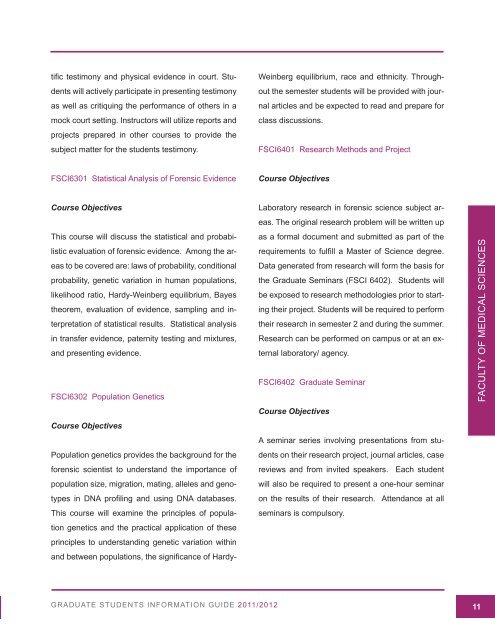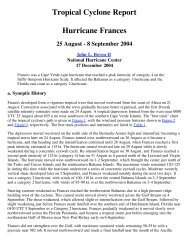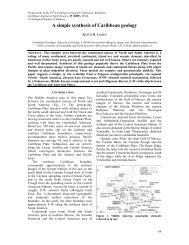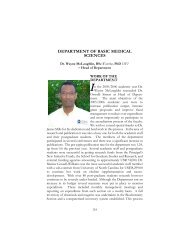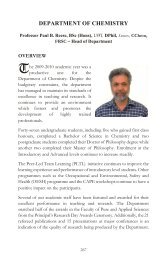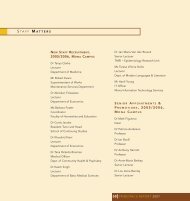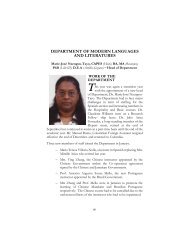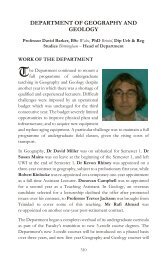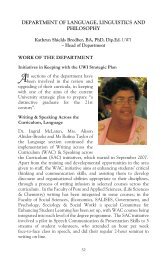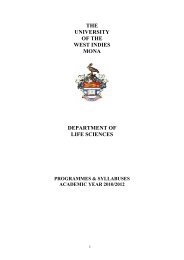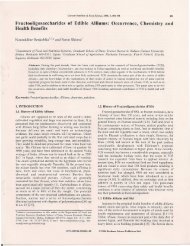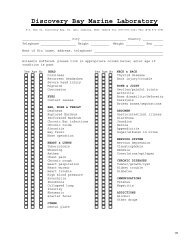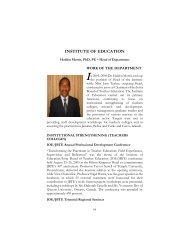Medical Sciences - University of the West Indies
Medical Sciences - University of the West Indies
Medical Sciences - University of the West Indies
Create successful ePaper yourself
Turn your PDF publications into a flip-book with our unique Google optimized e-Paper software.
tific testimony and physical evidence in court. Students<br />
will actively participate in presenting testimony<br />
as well as critiquing <strong>the</strong> performance <strong>of</strong> o<strong>the</strong>rs in a<br />
mock court setting. Instructors will utilize reports and<br />
projects prepared in o<strong>the</strong>r courses to provide <strong>the</strong><br />
subject matter for <strong>the</strong> students testimony.<br />
FSCI6301 Statistical Analysis <strong>of</strong> Forensic Evidence<br />
Course Objectives<br />
This course will discuss <strong>the</strong> statistical and probabi-<br />
listic evaluation <strong>of</strong> forensic evidence. Among <strong>the</strong> areas<br />
to be covered are: laws <strong>of</strong> probability, conditional<br />
probability, genetic variation in human populations,<br />
likelihood ratio, Hardy-Weinberg equilibrium, Bayes<br />
<strong>the</strong>orem, evaluation <strong>of</strong> evidence, sampling and interpretation<br />
<strong>of</strong> statistical results. Statistical analysis<br />
in transfer evidence, paternity testing and mixtures,<br />
and presenting evidence.<br />
FSCI6302 Population Genetics<br />
Course Objectives<br />
Population genetics provides <strong>the</strong> background for <strong>the</strong><br />
forensic scientist to understand <strong>the</strong> importance <strong>of</strong><br />
population size, migration, mating, alleles and genotypes<br />
in DNA pr<strong>of</strong>iling and using DNA databases.<br />
This course will examine <strong>the</strong> principles <strong>of</strong> population<br />
genetics and <strong>the</strong> practical application <strong>of</strong> <strong>the</strong>se<br />
principles to understanding genetic variation within<br />
and between populations, <strong>the</strong> significance <strong>of</strong> Hardy-<br />
Weinberg equilibrium, race and ethnicity. Throughout<br />
<strong>the</strong> semester students will be provided with journal<br />
articles and be expected to read and prepare for<br />
class discussions.<br />
FSCI6401 Research Methods and Project<br />
Course Objectives<br />
Laboratory research in forensic science subject areas.<br />
The original research problem will be written up<br />
as a formal document and submitted as part <strong>of</strong> <strong>the</strong><br />
requirements to fulfill a Master <strong>of</strong> Science degree.<br />
Data generated from research will form <strong>the</strong> basis for<br />
<strong>the</strong> Graduate Seminars (FSCI 6402). Students will<br />
be exposed to research methodologies prior to starting<br />
<strong>the</strong>ir project. Students will be required to perform<br />
<strong>the</strong>ir research in semester 2 and during <strong>the</strong> summer.<br />
Research can be performed on campus or at an external<br />
laboratory/ agency.<br />
FSCI6402 Graduate Seminar<br />
Course Objectives<br />
A seminar series involving presentations from students<br />
on <strong>the</strong>ir research project, journal articles, case<br />
reviews and from invited speakers. Each student<br />
will also be required to present a one-hour seminar<br />
on <strong>the</strong> results <strong>of</strong> <strong>the</strong>ir research. Attendance at all<br />
seminars is compulsory.<br />
GRADUATE STUDENTS INFORMATION GUIDE 2011/2012 11<br />
FACULTY OF MEDICAL SCIENCES


